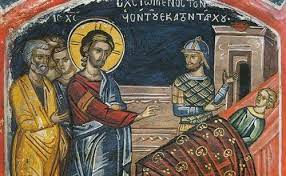HOMILY ADVENT WEEK 01 01- Year II
Faith and Love
(Is 2:1-5; Ps 122; Mt 8:5-11, 13)
**********************************************
“Many will come from the east and the west and will recline … at the banquet in the kingdom of heaven” (Matthew 8:11).
Today’s readings for this first weekday of Advent invite us to place our complete faith in Jesus and celebrate the inclusive love of God in Him.
 The Word Among Us tells us Jesus was amazed that this Roman soldier had exhibited such faith in him – more faith, even, than any of his fellow Jews. And yet, in Jesus’ time, this man would not have qualified or been considered worthy to be on the “guest list” for that heavenly banquet. But that didn’t stop Jesus; he made it clear he had come to save not only the Jewish people but every single person, including this pagan Roman commander.
The Word Among Us tells us Jesus was amazed that this Roman soldier had exhibited such faith in him – more faith, even, than any of his fellow Jews. And yet, in Jesus’ time, this man would not have qualified or been considered worthy to be on the “guest list” for that heavenly banquet. But that didn’t stop Jesus; he made it clear he had come to save not only the Jewish people but every single person, including this pagan Roman commander.
This is the heart of the good news Jesus was proclaiming: no one was excluded from God’s guest list: not that Roman soldier, not any other Roman, not any Greek or anyone else alive at that time. And the same holds true today: not the nephew who says he’s an atheist, not the neighbor who has struggled all his life with addiction, not the coworker enmeshed in New Age practices. Everyone is on the list. Everyone is invited.
Why such a wide invitation into the kingdom of heaven? Because God loves each person equally and deeply. They don’t have to believe in him for him to love them. They don’t have to love him for him to love them. They don’t even have to repent of their sins before he will love them!
This is an important truth to keep in mind in these weeks leading up to Christmas. There are usually more parties and family gatherings this month, and we will likely be around people we don’t normally see. That means there will be more opportunities to share with people about Jesus’ open invitation. We don’t have to worry about what to say, either. We can just share how we have experienced God’s love in Jesus. We can talk about how we have felt in good times and in bad times, when we felt deserving of that love, and when we felt unworthy of it. We can let our story assure them all the kingdom of God is available to them as well. We can help them see that Jesus’ love is wide enough for everyone.
The natural tendency is for us to resist this broad reach of God’s unconditional love, to instinctively judge others who are not doing what we are doing as well as we are doing it as not belonging, to see us as “in” and them as “out.” This is especially tempting for those who cling to a narrow interpretation of the saying “Outside the church there is no salvation.” As appealing as this attitude of greater worthiness and purity applied to us is, it is very difficult if not impossible to reconcile that attitude with these words of Jesus: “Truly I tell you, in no one in Israel (or perhaps today he would say the Roman Catholic Church) have I found such faith. I tell you; many will come from east and west and will eat with Abraham and Isaac and Jacob in the kingdom of heaven.”
Søren Kierkegaard defined faith as “a passion for the impossible.” Faith goes beyond reason; it is a passion for what reason can’t see. That centurion had a passion for the impossible. And that’s why Jesus says to him, in some of the highest praise you’ll find in the Gospel: “In no one in Israel have I found such faith.”
The bottom line seems to be even rudimentary faith in Jesus and some response to his presence, like the Roman centurion who came to Jesus and appealed to him to heal his paralyzed servant when Jesus came into Capernaum. The fact that he was not a member of the Jewish synagogue community, never went to offer sacrifice in the temple and did not pray the Jewish ritual prayers did not seem to matter to Jesus. Can we be like Jesus, trust that there are many rooms in the Father’s house, try not to judge those different from us and simply, as the above reflection points out, share with others how God’s unconditional love in Jesus has forgiven, healed and transformed us, and can do the same for them?
The Eucharist is not a test for the worthy – it is medicine for all of us who truly are not worthy of that unfathomable love of God made present in Jesus through Word and sacrament. In fact, we all fervently pray, just before receiving communion, words similar to those of the pagan Roman centurion, “Lord, I am not worthy to have you come under my roof; but only speak the word,” and my soul will be healed.
Our task, having experienced that abundant unconditional love of God overlooking our own unworthiness, is to go out and share that same love with all others, as Jesus did throughout all his ministry, and especially on the Cross as he forgave those who were crucifying him.



